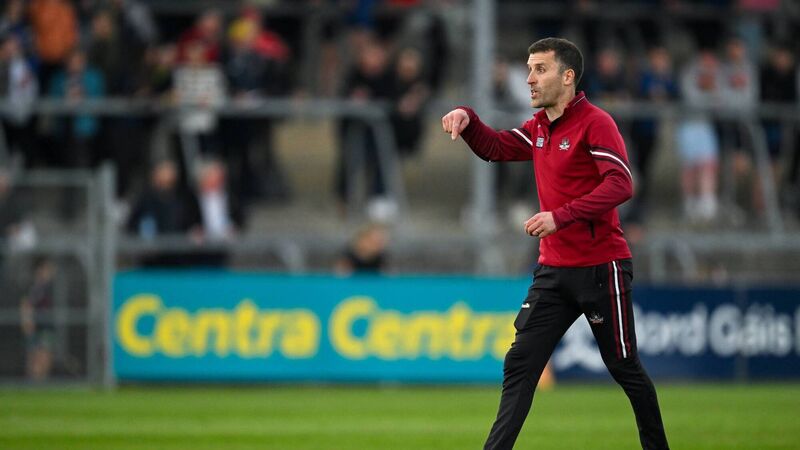Christy O'Connor on GAA: How will earlier return to training impact county players

New Cork manager Ben O'Connor will now be able to gather his squad for preseason training in November instead of December. Picture: Brendan Moran/Sportsfile
At the end of the Wexford-Wicklow Division 4 league football match last March, a big crowd entered the pitch to celebrate and congratulate the Wexford players and management on their promotion to Division 3.
The victory secured Wexford’s first promotion since 2018 but the achievement was all the more satisfying again because Wexford had their business wrapped up with two games to spare.
That is a rare enough occurrence. In the last ten years, only two other teams were promoted after five wins – Cork in 2020, and Derry in 2019. However, both sides were expected to dominate their division in those seasons, with Cork winning all seven games in Division 3, while Derry also reached a maximum tally of 14 points from Division 4 the previous year.
Wexford went on to win all seven league games and, while their championship and Tailteann Cup campaigns were disappointing, Wexford achieved their overriding ambition for the season.
“At the start of the year, we were very clear that our number-one priority was the league,” said Wexford manager John Hegarty to Seán Moran in the Irish Times a few weeks back. “If we didn’t get promotion, no matter how you wrapped it up, then the project was a failure.”
Wexford had achieved their primary goal as early as March 9th, which was the peak of their season. Having played six matches in six successive weeks, which included a Division 4 final and the first round of the Leinster championship, Wexford didn’t play again for another five weeks until the first round of the Tailteann Cup.
Wexford reached the quarter-final of that competition but prioritising the league has always made sense for so many teams who want to move up the ladder. Wexford’s situation also reaffirmed how, for so many teams, their entire season effectively hinges on a nine-week block between the end of January and the end of March. And if teams don’t get the balance right there, the rest of the season is a struggle to fulfil their goals.
In that context, most football counties favoured a return to the pre-season competitions, which were suspended last year, but which will return in January after confirmation at Saturday’s Central Council meeting in Croke Park.
That was always likely to happen, especially when the provincial councils were so keen for them to return because of the lost revenue in gate receipts.
Some managers still prefer challenge games but that’s mostly the top counties who go deep into the championship, whereas the majority of managers prefer the uniformity of provincial competitions – especially when it’s so difficult to get pitches in January.
The pre-season competitions also expose up-and-coming players to the rigours of senior inter-county football but the GPA had sought the suspension of pre-season competitions last year to ensure a zero-contact month of November for inter-county players.
The reality though, is that most teams were training during that month anyway, long before the official start date of December 7.
The restoration of the pre-season competitions will now bring forward the official start of pre-season training to early November. Although protocols relating to that return have yet to be confirmed, the GPA had insisted on an eight-week run-in to the early January start of the provincial competitions.
Adding another month to the inter-county season goes against what the GAA, in principle, is trying to achieve around shortening the season to ease the burden on players.
Last year, Tom Parsons, GPA CEO, revealed some data of 56% of players reporting having had less than two weeks' rest between club and inter-county activities. And 78% of players last year voted for a zero-contact month in November to allow them to mentally unwind. But that didn’t happen in most counties.
Managers didn’t want to be playing catch-up on counties who were already back training but players also accepted that reality. Few clubs have an S&C coach or set-up comparable to an inter-county squad so a lot of players realised the need to get back as soon as possible so they wouldn’t break down early on in the league when the games are coming thick and fast.
Despite the players wanting a break in November, the GPA also accepted that wasn’t happening, and it wasn’t going to happen if the official return to training remained at December 7.
At last January’s Central Council meeting, Parsons reported that five county teams commenced training prior to December 7, a figure widely considered a conservative estimate.
In his annual report published a few days after Parsons made that declaration last January, GAA director general Tom Ryan wrote: “If this structure (having a zero contact month in November) is to persist, we must make it work. Otherwise the sacrifice of those (pre-season) competitions is just pointless. So that means everybody stretching their thinking a bit.”
It's likely that the pre-season competitions will only return for one year before being discontinued permanently from 2027, but that logic is tied into the championship season being extended into August (for the football final) in 2027, if a motion is passed at Congress in February.
In a different form now though, a return to the pre-season competitions does lengthen the 2026 season. It may be not what all players and managers want. But what was happening would continue to happen anyway if Saturday’s decision was not made.







 App?
App?







